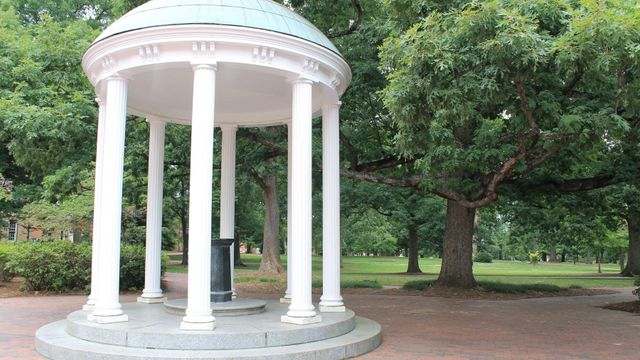Faculty say Hannah-Jones tenure saga tarnished UNC-Chapel Hill's reputation
University of North Carolina at Chapel Hill faculty were stung Tuesday by Nikole Hannah-Jones' rejection of a tenured position at the Hussman School of Journalism and Media, but their ire was pointed at the university's Board of Trustees and administration.
Posted — Updated"While disappointed, we are not surprised," dozens of Hussman School faculty and staff members wrote in an online post. "The appalling treatment of one of our nation’s most-decorated journalists by her own alma mater was humiliating, inappropriate and unjust. We will be frank. It was racist."
Hannah-Jones, a UNC-Chapel Hill alumna and a Pulitzer Prize-winning reporter for The New York Times, was hired in April as the Knight Chair in Race and Investigative Journalism at the Hussman School. But instead of granting her tenure, as previous Knight Chairs had, she was offered a five-year contract. Her supporters said the decision was because of her work on the 1619 Project, which focused on slavery's lasting impact on American history.
"Our school highly regards Ms. Hannah-Jones’s work, ability and achievements," the Hussman faculty and staff wrote. "We regret that the top echelons of leadership at UNC-Chapel Hill failed to follow established processes, did not conduct themselves professionally and transparently, and created a crisis that shamed our institution, all because of Ms. Hannah-Jones’s honest accounting of America’s racial history. It is understandable why Ms. Hannah-Jones would take her brilliance elsewhere."
Mimi Chapman, UNC-Chapel Hill faculty chairwoman, said she was "pretty devastated" when she learned Tuesday morning that Hannah-Jones wouldn't be teaching on campus but had instead accepted a tenured Knight Chair position at Howard University.
"It’s a very sad day here," Chapman said. "I think it already had impacted our reputation. To be the subject of such intense scrutiny over the course of a month to six weeks, you can’t help but – I guess if you were an outsider to UNC, I guess you couldn’t help but wonder what this campus is like, what it would be like to come here either as a faculty, a staff member or a student."
Kristi Booker, co-founder of the Proud UNC Alumni Group, which took out a two-page newspaper ad in support of Hannah-Jones that was signed by 1,619 alumni, said such questions have persisted among minority students and faculty for years.
"It’s very disappointing that they have compromised their academic integrity and their academic reputation in this decision that, at the end of the day, is rooted in racism and yielding to the small-minded opinions of certain donors and the Board of Governors and Board of Trustees," Booker said. "UNC seems to be barreling down a path backwards in not being progressive and creating an environment that is not allowing for faculty of color, staff of color or students of color to thrive."
Walter Hussman, a major donor whose name is on the journalism school, had earlier questioned Hannah-Jones, saying the 1619 Project wasn't objective reporting, and he didn't want the school dragged into the national controversy over it. On Tuesday, he said he still has concerns about the reporting, but he wished Hannah-Jones well at Howard.
"Any comments or concerns I had personally about it had absolutely nothing to do with race or gender," Hussman told WRAL News. "I certainly respect her decision, and it's her decision to make."
Hannah-Jones criticized Hussman for not supporting her hiring.
"I cannot imagine working at and advancing a school named for a man who lobbied against me, who used his wealth to influence the hires and ideology of the journalism school, who ignored my 20 years of journalism experience, all of my credentials, all of my work, because he believed that a project that centered Black Americans equaled the denigration of white Americans," she said in a statement released by the NAACP Legal Defense and Educational Fund. "Nor can I work at an institution whose leadership permitted this conduct and has done nothing to disavow it."
Susan King, dean of the Hussman School, said she's upset Walter Hussman continues to question Hannah-Jones' reporting.
"Nikole Hannah-Jones is a once-in-a-generation journalist, and she’s raising important issues, and I respect her," King said. "I’m sorry he continues to raise questions about her. I don’t think she deserves it."
Deen Freelon, an associate professor at the Hussman School, said the episode has damaged UNC-Chapel Hill's reputation.
"I think it’s time to acknowledge that there has been damage and to start the very long and arduous task of repairing that damage," Freelon said. "I think it’s time to hold the administration to account when they say they are about diversity [or] when they say they are about uplifting the perspectives of all. I think we should make sure that that is more than just lip service."
The university needs "cluster hires" of Black faculty and more support for Black students, he said. Booker added that the Board of Trustees also needs to acknowledge publicly that it bungled Hannah-Jones' hiring.
Chancellor Kevin Guskiewicz didn't make any such admissions on Tuesday, but he vowed to press forward in an effort to make UNC-Chapel Hill more welcoming to Black students, faculty and staff.
"I remain committed to recruiting and retaining the world-class faculty that our students deserve at Carolina," Guskiewicz said in a statement. "I recognize there are still questions and a great deal of work ahead. I am absolutely committed to pressing on and partnering with all those who desire to make Carolina a more welcoming place where every member of our community can realize their full potential."
Chapman said the university is at "a crisis point."
"I think our governing structure is no longer working," she said. "We are in a situation where the people in those positions are not demonstrating that they have the interest of the institution at heart. That’s a very difficult place to be, and I’m not sure what we do to escape that."
King said she is focused on rebuilding trust in the Hussman School, especially with students and faculty of color.
"This is an opportunity for us to have frank conversations," she said. "We have to, I think, find common ground, and that is my belief, as a dean, that my calling is now."
"We could learn from such a disgusting turn of events that happened and that really exposed all the problems we have in our university regarding race," said Deb Aikat, a Hussman School professor. "This should be a moment of reckoning for our university."
The majority of UNC Black Caucus members recently said they were looking to leave the university, but Freelon, who is Black, said he wants to stay and help UNC-Chapel Hill improve.
"What’s happened at UNC is not limited to UNC, and there’s really kind of nowhere to run," he said. "You go someplace else, [and] it’s only a matter of time before you start seeing these kinds of issues."
"The fight for the future of our university and school is just beginning. What has occurred over the past several months has brought long-ignored issues in our community and nation to the forefront," the Hussman faculty and staff wrote in their online post. "We strive to live up to your ideals, and will continue to fight to make UNC a university for all people."
"The fight was never for her to come to UNC," Student Body President Lamar Richards tweeted. "It was always bigger than that. History will remember this as the beginning of a revolution."
Related Topics
• Credits
Copyright 2024 by Capitol Broadcasting Company. All rights reserved. This material may not be published, broadcast, rewritten or redistributed.






